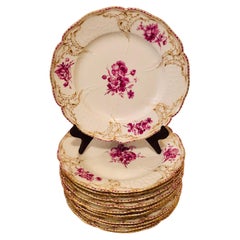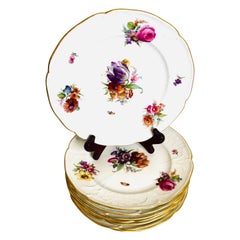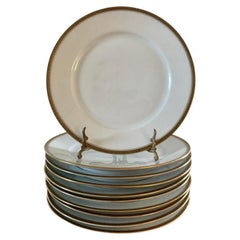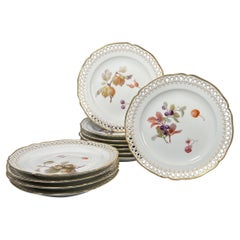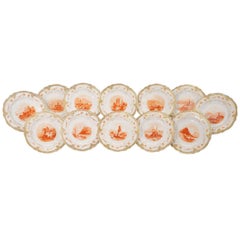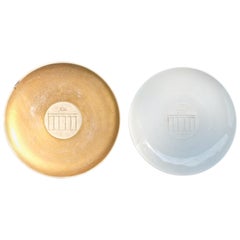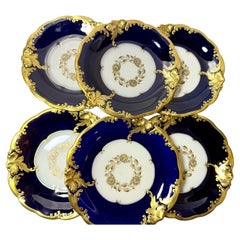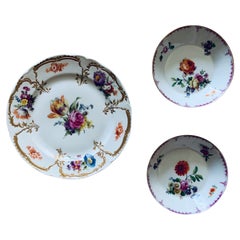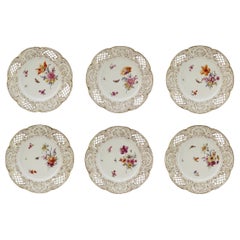Kpm Plate
Vintage 1910s German Rococo Dinner Plates
Porcelain
Vintage 1910s German Romantic Tableware
Porcelain
Vintage 1920s German Neoclassical Dinner Plates
Porcelain
Antique Early 1900s German Aesthetic Movement Dinner Plates
Porcelain
Antique 19th Century German Dinner Plates
Porcelain, Paste
Vintage 1930s German Art Deco Porcelain
Porcelain
Mid-20th Century German Porcelain
Porcelain
20th Century German Rococo Porcelain
Porcelain
Early 20th Century German Art Nouveau Ceramics
Porcelain
Antique 19th Century German Biedermeier Wall-mounted Sculptures
Silver
Antique Late 19th Century German Neoclassical Revival Religious Items
Porcelain
Vintage 1940s German Porcelain
Porcelain
Early 20th Century German Porcelain
Porcelain
Antique 19th Century German Rococo Revival Platters and Serveware
Porcelain
Antique 1890s German Victorian Porcelain
Porcelain
Vintage 1930s Polish Porcelain
Porcelain
Vintage 1930s Polish Porcelain
Porcelain
Vintage 1930s Polish Porcelain
Porcelain
Vintage 1920s German Porcelain
Porcelain
Early 20th Century German Porcelain
Porcelain
Vintage 1940s Danish Porcelain
Porcelain
Vintage 1940s Danish Porcelain
Porcelain
Vintage 1930s Polish Porcelain
Porcelain
Vintage 1930s Polish Porcelain
Porcelain
Vintage 1930s Polish Porcelain
Porcelain
Vintage 1930s Polish Porcelain
Porcelain
Vintage 1930s Polish Porcelain
Porcelain
Antique Late 19th Century German Decorative Art
Porcelain
Antique Late 19th Century German Tableware
Porcelain
Vintage 1940s Danish Porcelain
Porcelain
Vintage 1940s Danish Porcelain
Porcelain
Early 20th Century German Romantic Decorative Dishes and Vide-Poche
Porcelain
Vintage 1970s German Country Porcelain
Porcelain
20th Century European Neoclassical Revival Decorative Art
Other
20th Century German Neoclassical Decorative Dishes and Vide-Poche
Ceramic
Antique 19th Century Austrian Victorian Porcelain
Gold
1880s Academic More Art
Porcelain, Oil
Antique Late 19th Century German Dinner Plates
Porcelain
Antique 1890s German Neoclassical Dinner Plates
Porcelain
Early 20th Century German Dinner Plates
Early 20th Century German Romantic Dinner Plates
Porcelain
Vintage 1920s German Dinner Plates
Porcelain
Early 20th Century German Dinner Plates
Porcelain
Antique Late 19th Century German Dinner Plates
Porcelain
20th Century Dinner Plates
Porcelain, Paste
Vintage 1910s German Porcelain
Porcelain
Vintage 1910s French Romantic Porcelain
Porcelain
Antique 1880s German Romantic Porcelain
Porcelain, Wood
Antique 1870s German Romantic Porcelain
Porcelain, Wood
Antique 1840s German Porcelain
Porcelain
Antique 19th Century German Porcelain
Porcelain
Antique 19th Century German Porcelain
Porcelain
Antique 19th Century German Empire Porcelain
Porcelain
Antique Late 19th Century German Porcelain
Porcelain
Vintage 1960s German Belle Époque Decorative Dishes and Vide-Poche
Porcelain
Early 20th Century German Dinner Plates
Porcelain, Paste
Early 20th Century German Romantic Dinner Plates
Porcelain
Early 20th Century German Romantic Dinner Plates
Porcelain
- 1
Kpm Plate For Sale on 1stDibs
How Much is a Kpm Plate?
Finding the Right Dining-entertaining for You
Your dining room table is a place where stories are shared and personalities shine — why not treat yourself and your guests to the finest antique and vintage glass, silver, ceramics and serveware for your meals?
Just like the people who sit around your table, your serveware has its own stories and will help you create new memories with your friends and loved ones. From ceramic pottery to glass vases, set your table with serving pieces that add even more personality, color and texture to your dining experience.
Invite serveware from around the world to join your table settings. For special occasions, dress up your plates with a striking Imari charger from 19th-century Japan or incorporate Richard Ginori’s Italian porcelain plates into your dining experience. Celebrate the English ritual of afternoon tea with a Japanese tea set and an antique Victorian kettle. No matter how big or small your dining area is, there is room for the stories of many cultures and varied histories, and there are plenty of ways to add pizzazz to your meals.
Add different textures and colors to your table with dinner plates and pitchers of ceramic and silver or a porcelain lidded tureen, a serving dish with side handles that is often used for soups. Although porcelain and ceramic are both made in a kiln, porcelain is made with more refined clay and is more durable than ceramic because it is denser. The latter is ideal for statement pieces — your tall mid-century modern ceramic vase is a guaranteed conversation starter. And while your earthenware or stoneware is maybe better suited to everyday lunches as opposed to the fine bone china you’ve reserved for a holiday meal, handcrafted studio pottery coffee mugs can still be a rich expression of your personal style.
“My motto is ‘Have fun with it,’” says author and celebrated hostess Stephanie Booth Shafran. “It’s yin and yang, high and low, Crate & Barrel with Christofle silver. I like to mix it up — sometimes in the dining room, sometimes on the kitchen banquette, sometimes in the loggia. It transports your guests and makes them feel more comfortable and relaxed.”
Introduce elegance at supper with silver, such as a platter from celebrated Massachusetts silversmith manufacturer Reed and Barton or a regal copper-finish flatware set designed by International Silver Company, another New England company that was incorporated in Meriden, Connecticut, in 1898. By then, Meriden had already earned the nickname “Silver City” for its position as a major hub of silver manufacturing.
At the bar, try a vintage wine cooler to keep bottles cool before serving or an Art Deco decanter and whiskey set for after-dinner drinks — there are many possibilities and no wrong answers for tableware, barware and serveware. Explore an expansive collection of antique and vintage glass, ceramics, silver and serveware today on 1stDibs.
Read More
1882 Ltd. Looks to the Future of Ceramics in the U.K. with an Eclectic Exhibition and Auction
Faye Toogood and John Pawson are among the list of plate designers.
20 Inviting Dining Rooms Perfectly Arranged for Entertaining
Top interior designers show — and tell — us how to create delectable spaces for hosting dinner parties.
Paul Revere Crafted This Silver Coffee Pot 250 Years Ago
Perhaps best known as a Revolutionary War hero, Revere was also an accomplished silversmith, and this pot is now available on 1stDibs.
From Arne Jacobsen to Zaha Hadid, Top Designers Tackle Tableware
Clever objects like these make feasting even more festive.
How the Chunky, Funky Ceramics of 5 Mid-Century American Artists Balanced Out Slick Modernism
Get to know the innovators behind the pottery countercultural revolution.
Ready for a Cinderella Moment? This Glass Handbag Is a Perfect Fit
Glass slippers might be the stuff of fairytales, but glass handbags? Artist Joshua Raiffe has made them a reality, and they're far less delicate than you might imagine, but just as dreamy.
With Dansk, Jens Quistgaard Delivered Danish Simplicity to American Tables
When a visionary Copenhagen designer teamed up with an enterprising Long Island couple, Scandi-style magic landed in kitchens and dining rooms across the United States.
Hostess Extraordinaire Aerin Lauder Shares Entertaining Tips and Auction Picks
The arbiter of good taste, who has curated a collection for 1stDibs Auctions, invites 1stDibs inside her family’s Hamptons barn for a firsthand look at her welcoming style.
